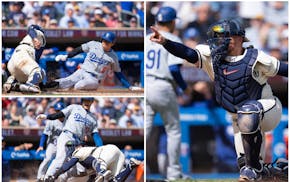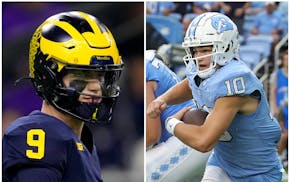Artis Hicks played in 118 career games in 10 NFL seasons as an offensive lineman. His list of injuries reads like something out of a medical journal.
He suffered partially torn ligaments in both knees, a cervical spine injury, a herniated disk in his lower back, separated shoulders, dislocated fingers, multiple high-ankle sprains.
Hicks tore a triceps in the Vikings' 2008 season-opener but elected to put off surgery until after the season, his pain tolerance aided by prescription narcotics.
Painkillers and anti-inflammatory injections became part of his regular routine. As a veteran, he refused to play without a Sunday morning shot of Toradol in his rear.
"Toradol is the best thing — as far as my career. It's the best medicine that kept guys on the field," he said. "I've seen guys tear ligaments, tear muscles, break bones and play through it and not even realize it until a couple days after because of Toradol."
So why, then, did Hicks join a lawsuit brought by 750 former players recently, accusing the NFL of illegally and unethically supplying them with drugs designed to mask pain and allow players to perform on game day?
"We put our trust in team trainers, team doctors, and when they don't inform us, then I feel like there's blatant negligence there," he said.
Hicks contends the league failed to properly inform players of potential long-term risks and side effects from routinely ingesting painkillers and anti-inflammatories.
Hicks argues that the league does not educate players on those risks because players might be reluctant to rush back to action if injured, which, in turn, would hurt the on-field product and the NFL's overall profit.
"Without Toradol and cortisone," he said, "the NFL as we know it would not exist."
The use of painkillers in the NFL remains a complicated issue that does not involve easy answers. Even former players argue the merits of this lawsuit, including one who described it as a "money grab."
One thing is certain: NFL players need prescription drugs and anti-inflammatories to survive a season. The damage they inflict on their bodies necessitates medicinal help. There's no way around that.
But the "North Dallas Forty" perception of teams passing out painkillers like Halloween candy is an inaccurate portrayal of today's NFL, according to players contacted by this paper two years ago for a series on painkiller use. Those players said teams maintain strict procedures on prescribing drugs.
This level of scrutiny didn't exist years ago, though. Former players describe a different attitude toward painkiller distribution, and so the question becomes: Did NFL teams misinform players about injuries and/or the risks in consuming a cocktail of painkillers for the sake of helping their business?
The NFL culture is unsympathetic toward pain and injuries. If you're hurt, you're no good to teams. Contracts are not guaranteed, and the average NFL career lasts only a fraction of time. Players do whatever is necessary to keep their job.
Yes, players are aware of those inherent risks, but this is their livelihood and they should be afforded certain protections. Teams carry an obligation to advise players on the dangers of repeated use of painkillers and anti-inflammatories.
"If I would have known some of these long-term side effects and the risks you're putting on yourself, I probably wouldn't have tried every anti-inflammatory out there," Hicks said. "I probably wouldn't have got injected with cortisone in my joints."
Hicks' story is fairly common. He relied on different painkillers, sleep aids and pregame Toradol injections to make it through a season. He said he received an injection even if he wasn't starting because he wanted that "reassurance."
"The Toradol numbs you, it takes the hurt off for you to be able to go out and do your job," he said.
Now, Hicks questions whether it was worth it. He made enough money to live comfortably, but he worries about the damage he's done to his body. He said he's losing weight and avoiding painkillers in retirement.
"All the years that I played and all the stuff I had given to me, my organs have taken a beating," he said. "We did a lot of damage without even knowing the repercussions of what we're doing because it was never laid out for us.
"You don't know how much pain you're in until you don't have these doctors giving you all these medications and anti-inflammatories. When I retired, about four months into it, I was like, 'Damn, I hurt.' "
Chip Scoggins • chip.scoggins@startribune.com

Scoggins: Finch feeling heat of the Suns as playoff battle looms
Scoggins: Why 'championship or bust' fits these Wolves

Scoggins: Anatomy of a game-saving play as Correa throws out Ohtani


